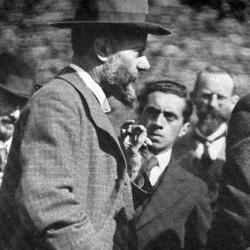Jason Josephson-Storm (Myth of Disenchantment) offers this potted history of modern physics:
“Even as Descartes liberated an autonomous realm for the thinking subject, his mechanism denied action at a distance and rejected the concept of the void. But this form of corpuscular mechanism was disrupted by Newton’s emphasis on occult forces like gravity, which produced action at a distance and also in some versions required constant divine or angelic intervention. Later natural philosophers worked to eliminate these, but as soon as Pierre-Simon Laplace and company purged the angels, the discovery of electricity as a seeming bridge between matter, mind, and nature reproduced a lively cosmos. Indeed, it was this research on electricity and magnetism, in both physics and biology, that gave a boost to mesmerists and spiritualists” (313).
Moving ahead: “When James Clerk Maxwell described electromagnetism mathematically, the rise of radioactivity and invisible rays cast us into the dawn of a vibratory atomic age. Again, pioneers of this science of the invisible like Edmund Fournier d’Albe argued that X-rays show not only the composition of the soul but also the reality of paranormal phenomena like ghosts. Just as quantum mechanics began to formalize the movement of fundamental particles, the Copenhagen interpretation marked out a limit on human knowledge and a position for subjectivity that we have still failed to overcome” (313).
Not to mention the recent turn of physicists to mysticism and eastern religions.
In short, “we repeatedly see in the realm of physics a dialectical alternation between disenchantment and enchantment” (313). Social scientists, unfortunately, have not paid close attention, often presenting a simplistic story of disenchantment in defiance of “what physicists actually believed” (314).












